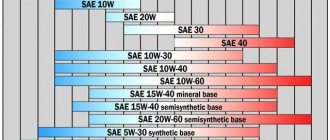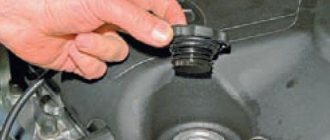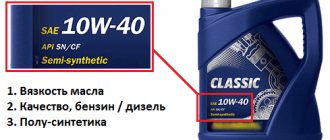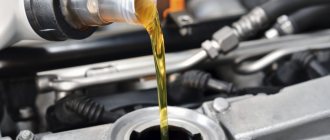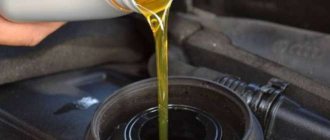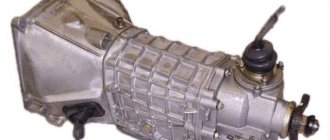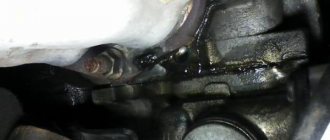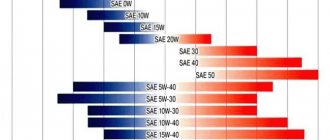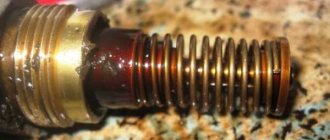Changing the oil in the engine of a VAZ-2112 car
It’s stupid to turn to the experts for every reason. Of course, when the procedure is too complex, requiring deep technical knowledge and the availability of the necessary tools on the part of the performer, then the desire to seek help and support from experienced specialists will be understandable. If you have to perform simple manipulations, you don’t need to foolishly waste money, fearing that you won’t succeed. After reading our recommendations, you will not only figure out how much oil you need to pour into a VAZ-2112 engine with 16 valves, but also increase your level of self-esteem, making sure that you have climbed a step higher and are closer to real mastery.
conclusions
The choice and replacement of oil depends on many factors. Thus, there is a list of recommended lubricating fluids for filling into the 16-valve VAZ-2112 engine. The choice of oil should be approached carefully, because it determines how well the engine will function and for a long time.
Good day to all! From this article you will learn everything about changing the VAZ 2112 oil
in the engine. I never thought that this article could appear on our website. Until a good friend of mine bought his first car and decided to change consumables. And everything would be fine if he knew what and how to do it. But he was doing everything for the first time, so a lot of questions arose. And everything would be simpler if he just opened this article and did it step by step. So let's get started.
Change of oil
Any business requires good theoretical preparation. We all begin to learn something in this life sooner or later. Only those who teach, and do not throw aside the proposed recommendations, gain insight. We are confident that you will be able to carefully read our advice and subsequently, no worse than experienced specialists at a service station, replace the oil fluid on a VAZ-2112.
Oil change intervals
If you are just a novice car enthusiast, you are unlikely to understand how to distinguish used oil from new one. Such knowledge will be useful if you purchased a car, and the former owners informed you about the recent change of engine oil, but you still doubt the veracity of such information.
The new oil has a light color, but the used oil already contains traces of combustion, which cause the oil fluid to darken. Accordingly, the darker the motor fluid, the older it is, the longer it is used. Of course, you should hurry to get rid of such processing so that your engine does not become unusable.
The frequency of oil change is influenced by several factors:
- general technical condition of your car’s engine;
- service life of the equipment after the last replacement;
- weather;
- type, technical parameters of the oil that was last poured into the engine;
- frequency of vehicle operation;
- quality of road surface;
- driving style;
- the quality of gasoline or diesel fuel used to refuel the car.
Most experienced car owners strongly recommend changing the oil on a VAZ-2112 at least once a year. In this case, your vehicle will simply “fly” along the highway, and the engine will work flawlessly and absolutely quietly, giving you pleasant emotions.
Checking the oil level and condition
We recommend looking under the hood not once a year, but much more often. It may happen that the oil begins to leak. You may not notice this initially, but the leakage of drop after drop will already provoke a certain amount of loss. It is dangerous when the oil level in the engine falls below the minimum level. The amount of lubricant will simply not be enough to cool the rubbing parts, provide excellent lubrication and prevent abrasion.
We recommend checking the oil level in the VAZ-2112 engine periodically. Simply lower the dipstick into the hole, and then after removing it, check where the oil mark is located. To make it easier to examine, we recommend wiping the dipstick with a rag first. So, if the oil trace suddenly appears below the minimum mark, do not operate your car under any circumstances until you have made up for the identified deficiency. Just add the missing amount into the filler hole.
We would like to warn you about one very important detail, if you ignore it you could commit a huge stupidity. Only fill in the oil that you previously poured in. If you have purchased a car and have absolutely no idea what is poured into the engine of your VAZ-2112, you are taking a risk, since some types of oil fluid, when mixed, enter into a chemical reaction, releasing substances harmful to the engine. For this reason, it is much easier to replace all the oil than to risk damaging the engine.
Choosing engine oil
In cases when the time has come to completely change the engine oil, you will first have to visit an auto store and purchase new oil and an oil filter. The auto shop can offer you:
- mineral oil;
- semi-synthetic;
- synthetic.
Mineral liquids have a high viscosity and have the advantage of being affordable. However, such oil does not allow the vehicle to be used for a long time without undergoing another replacement. With this choice, it is recommended to change the oil fluid after a run of 4 thousand kilometers. Semi-synthetic oils allow the engine to warm up faster in winter. It is necessary to change the oil after six thousand kilometers.
If you are in love with your car, do not spare your financial savings for it, buy the most expensive synthetic oil, which has the best technical characteristics and allows you not to replace it until the eight thousand mileage.
Getting ready for replacement
Now all that remains is to carefully prepare for the upcoming procedure. To ensure that nothing interferes with achieving the result, it is very important to have all the necessary tools at hand. This does not mean that you will need to incur serious financial expenses by purchasing a lot of small things. We are sure you already have some of what you need. The rest of the material can be purchased. So, you will need:
- open-end wrench (size “17”);
- oil filter puller;
- screwdriver;
- rags;
- container, the volume of which must be at least 4 liters.
Step-by-step instruction
We offer step-by-step instructions that will help you figure out how to independently change the oil in a VAZ-2112 engine. First of all, you need to get rid of the old motor oil. The manufacturer provided for this point by introducing a special drain hole. You need to first unscrew the lid and then place the container so that the waste flows into it. It is unlikely that you will be able to open the drain plug with your bare hands, so it is best for you to use the same open-end wrench that you prepared in advance.
Here we note that the oil liquid itself is viscous, so it will flow excessively slowly from this hole and drain from the walls of the engine. We recommend that you speed up this process. To do this, you just need to drive your “iron horse” before carrying out the procedure, allowing the engine to warm up. As soon as the engine warms up, it will immediately stimulate the heating of the engine fluid, which will become less viscous and will flow out of the open hole faster.
Take the time to flush the engine before pouring new oil into it. There is nothing complicated in carrying out this manipulation. You need to fill in a special flushing fluid that is sold in car dealerships, start the engine and let it idle for ten minutes. Then drain the liquid in the same way as you drained the waste.
Take a screwdriver and disconnect the old oil filter, install a new one in its place.
Changing engine oil on a VAZ-2112 16 valves: photos and videos
VAZ hatchbacks of the 2112 family were produced with one of two 16-valve engines: 21120 and 21124. The volume of these engines is different, and they even differ in appearance. But if the engine design has 16 valves, then changing the oil on a VAZ-2112 will take 15 minutes. The point is that the oil filter will be accessible from under the hood. And we will change this filter.
Tips for choosing an oil filter are presented in the video:
All steps to change oil for engine “21120”
We change the oil with the engine fully warmed up. First, engage the handbrake and unscrew the neck plug. Then remove the plastic cover.
Fastening – 4 metric screws
Possible options: fastening with screws (key “10”) or with rubber bands. In the second case, simply move the lid up.
There is a plug on the bottom of the oil pan. It is unscrewed with a 17 key. First you need to substitute an empty container.
The plug is unscrewed with a key
As a result, 3.2-3.3 liters of waste will be drained. You need to wait at least 10 minutes.
When the oil is drained, the plug is returned to its place. Recommended tightening torque is 28.7-46.3 N*m.
Replacing the oil filter
If the filter will not be replaced, proceed to the next chapter. The filter housing is very easy to find: you need to stand near the right wheel and look under the exhaust manifold.
Found the oil filter housing
The old filter can most often be unscrewed by hand. If that doesn't work, take a puller. Installation of a new filter is done as follows:
The tightening force for the filter housing is 37.48–87.47 N*m.
Instead of a puller, a screwdriver is sometimes used. Then the filter jar is pierced closer to its bottom!
Engine 2112 characteristics
Years of production - (1997 - 2004) Cylinder block material - cast iron Power system - injector Type - in-line Number of cylinders - 4 Valves per cylinder - 4 Piston stroke - 71mm Cylinder diameter - 82mm Compression ratio - 10.5 Engine displacement 2112 - 1499 cm cube Engine power 2112 – 93 hp. /5600 rpm Torque - 128 Nm / 3700 rpm Fuel - AI95 Fuel consumption - city 8.8 l. | track 5.5 l. | mixed 7.2 l/100 km Oil consumption - 50 g/1000 km Weight of the VAZ 2112 engine - 127 kg Overall dimensions of the 2112 engine (LxWxH), mm - Oil for the VAZ 2112 engine: 5W-30 5W-40 10W-40 15W40 How much oil in engine 2112: 3.5 l. When replacing, pour 3.2 liters.
Resource: 1. According to the plant – 150 thousand km 2. In practice – 250 thousand km
TUNING Potential – 400+ hp. Without loss of resource - up to 120 hp.
What kind of oil should I use and how much?
VAZ 2111 owners have a wide choice of viscosity classes. You can fill in synthetic and semi-synthetic 5W-30, 5W-40, 10W-40 and even 15W-40.
When purchasing, you need to focus on a 4-liter canister because... when filling up, the engine immediately consumes 3.2-3.5 liters. Don’t forget to leave it for daily monitoring and, if necessary, topping up the level.
The choice of a specific brand is not important; you can safely buy any market company you come across.
- Liqui Molly 10W40;
- LUK Genesis 5W-40;
- Zic 10W40 and 5W40;
- Castrol MAGNATEC 5W-40;
- Total 10W40;
- Shell Helix HX7 10W-40;
- Esso Ultra 10W-40 and many other companies.
Detailed oil selection table by viscosity, brand and year of manufacture
| Year | Viscosity SAE all season from +25 to -25 °C | winter from -35 to 0 °C | summer from 0 to +35 °C |
| 5W-30 5W-40 | 20W-40 20W-30 25W-30 |
| 5W-30 5W-40 | 20W-40 20W-30 25W-30 |
| 5W-20 5W-30 5W-40 | 20W-40 20W-30 25W-30 25W-40 |
| 5W-20 5W-30 5W-40 | 20W-40 20W-30 25W-30 25W-40 |
| 5W-20 5W-30 5W-40 | 20W-40 20W-30 25W-30 25W-40 |
| 5W-30 5W-40 0W-30 | 20W-40 20W-30 25W-30 25W-40 |
| 5W-40 | 20W-40 25W-30 25W-40 |
| 0W-30 5W-40 5W-30 | 20W-30 20W-40 25W-30 |
| 0W-30 5W-40 | 20W-40 25W-30 25W-40 |
| 0W-30 0W-40 | 20W-40 25W-40 |
| 0W-40 5W-40 | 20W-40 25W-40 25W-40 |
| 0W-40 5W-40 | 20W-40 25W-40 |
| 0W-30 0W-40 5W-40 | 20W-40 25W-40 |
Malfunctions and repairs of the VAZ 2112 engine
The VAZ 2112 (21103) engine is a qualitative evolution of the VAZ 2111 engine, but with 16 valves instead of 8 and gave rise to a series of VAZ gears that are produced to this day, already in the form of a prior engine. The main differences between the 2112 engine and the 2111 are the use of 4 valves per cylinder, 2 camshafts, this allows the engine to supply more fuel-air mixture to the combustion chamber at a time and quickly remove exhaust gases to the exhaust channel. Up to 3 thousand rpm, the engines operate approximately the same; after 3 thousand, 16V becomes much more dynamic. At the same time, fuel consumption is lower than on the 8 valve 2111. Engine VAZ 2112 1.5 liters. injection in-line 4-cylinder with an overhead camshaft, the gas distribution mechanism is belt driven. Cylinder block 2112, the same as on 21083, but with modified mounts under the cylinder head and additional oil channels for the main bearings, the VAZ 2112 engine number is stamped on the block under the thermostat. The normal operating temperature of the 2112 engine is 90 degrees. The service life of the 2112 engine, according to the manufacturer’s data, is 150 thousand km; in practice, the engines run more than 250 thousand km. The other side of the coin is the VAZ 2112 engine, when the timing belt breaks, the valve bends. The problem is solved by installing pistons from a 124 engine, but we will inevitably lose a few horsepower. If you do not want to lose power, you need to constantly monitor the condition of the belt. To do this, we listen to the sounds coming from the drive; the rollers usually begin to squeak when cold, then rustle, and then collapse. The pump begins to leak (the belt will be covered in coolant). The shaft seals are leaking (the belt is covered in oil). The shafts wear out - the belt begins to slide to the side and rub against the roller flange (grinding when cold). The belt can also slip due to crooked rollers. Problems and malfunctions: the 2112 engine is throttling or adjusting - measure the compression, is it normal? Check the ignition module, high-voltage wires and spark plugs, these are the main problems in this case. The engine speed of the VAZ 2112 1.5 is floating, the following should come under suspicion: the throttle valve (clean), the idle speed control, the crankshaft position sensor, the throttle position sensor (check, change) or something? Then the DMRV is to blame. The following malfunction, at idle and when driving (when changing gears), the 2112 engine stalls, the problem is in a dirty throttle valve, or in the IAC (idle speed control), possibly the TPS (throttle position sensor). Let's look further, engine 2112 does not start, what is the reason? The first is the starter and battery, the second is the ignition system, the third is the power supply system, if you can’t hear the fuel pump running, check its power supply, is everything okay? Check the pressure in the fuel supply system. Another malfunction, the VAZ 2112 engine does not heat up or does not heat up well to operating temperature, the thermostat has died, change it and drive without problems. What next, do you hear some kind of knocking noise in the VAZ 2112 engine? Almost always the problem is with hydraulic compensators. If they have nothing to do with it, then the oil pressure is low or too high, or the connecting rod or main bearings are knocking, and the pistons may also be knocking. In this case, it is better to go to a service center for diagnostics. It’s better to go for diagnostics and in the case when the VAZ 2112 engine pulls poorly, here you need to measure the fuel pressure in the rail, maybe it’s a problem with the injectors, maybe the filters are clogged, or maybe the clutch has just arrived. That's not all :) Can you feel the vibration of the VAZ 2112 engine? The problem is: idle air control, high-voltage wires, spark plugs, lambda probe, voltage regulator, clogged injectors, incorrect ignition timing. The list is decent, so as not to guess and waste time, let's go for diagnostics.
What kind of oil to pour into VAZ 2112 16 cl? | Topic author: Polina
I'm thinking semi-synthetic, but I don't understand what 5W40 or 10w40 means, so what should I pour?
Larisa We use mobile 15W40
Andrey 5W40 or 10w40 is the temperature classification of motor oils according to SAE. IF YOU NEED AN ALL SEASON THEN 10w40 will do. and synthetics or semi-synthetics depends on finances.
Vasily Yes, any, the first number is viscosity at low temperatures, the second at an operating temperature of 80-90, according to the API, the generation of the motor for which it is suitable, that’s all... I have ESSO 10w40 SJ….
Eduard Leite 10W40 in summer, and 5W40 in winter.
Galina I use synthetic... 10w40 castrol
Yaroslav Tsifra before W - winter viscosity Oksana, after - summer. Agip or BP, for example, will do just fine, but 5W40 is synthetic, more likely
Vyacheslav Used to use Mobile or Castrol. Now VR is 3000. There is no difference! Besides the price!
Valentina Viscosity grades SAE OW, 5W, 10W, 15W, 20W, 25W are winter grades, and SAE 20, 30, 40, 50, 60 are summer grades. Consider SAE 40. The higher the number, the more the oil will maintain its viscosity when heated. In city traffic and active driving, as well as when the air temperature is high, the engine is exposed to high temperatures. It is important to use oil that maintains its viscosity to a large extent at high temperatures to protect the engine. When the engine is cold, on the contrary, the oil tends to thicken. In this case, it is important that it remains liquid even at low temperatures in order to flow through the engine, protect its parts and aid starting. Cold viscosity is designated in SAE standards as “winter viscosity grade”. For example, SAE 10W. The number indicates the degree of winter viscosity. The lower the number, the more the oil will maintain its fluidity in cold weather and when starting the engine. Seasonal oils are usually used when operating temperatures do not differ much Leonid. All-season oils are designated by both winter and summer viscosity grades. For example, SAE 10W 40, where: 10W is a winter viscosity grade 40 is a summer viscosity grade
Artem went Helix 5w40 the best option! but change it after ten thousand.
Ivan Ley boldly 10B40 Castrol.
The question of which oil is equipped with an 8-valve injector is asked by many car owners, especially beginners. Synthetic or mineral water? ZIC or Castrol, Mobil or Shell? There is no exact answer, “to each his own.” However, in this article we will make a compelling case about the lubricants that are worth using.
Engine tuning VAZ 2112 1.5 16V
Chip tuning of VAZ 2112 engine
The first thing that comes to the mind of a novice tuner is engine firmware; all companies promise that your engine will at least fly... all this is heresy. Firmwares give the most minimal effect, which is very difficult to feel; you have to think about chip tuning when the engine is with a turbine; aspirated engines are a waste of money. Since it is correct to boost the VAZ 2112 engine, with minimal loss of life and with a maximum increase in horses. The simplest and fairly standard way to increase the power of a VAZ 2112 engine is to replace the camshafts with STI-1 (for a standard receiver), STI-3.1, STI-2 or Stolnikov 8.9 (more expensive than others), to make life easier for the engine, we install a light ShPG from 126 engine, throttle body 54-56 mm, mounted receiver and exhaust 4-2-1. At the output we have about 120 hp. Refinement of the cylinder head and evil wide-phase shafts can increase power to 130-140 or more hp. To this it is worth adding a crankshaft with a stroke of 75.6 to increase the engine capacity of the VAZ 2112 to 1.6 liters, lightweight T-shaped valves, modification of the cylinder head and intake manifold, at the output we get about 140-150 hp. For the city, these indicators are enough for almost any car enthusiast.
Generation 1 (1999 - 2008):
Engine VAZ 2112 16 valves 1.5 l. 93 hp
- When to change oil: 15000
Engine VAZ 21114/11183 8 valves 1.6l. 81 hp
- What kind of engine oil is filled from the factory (original): Synthetic 10W-40
- Oil types (by viscosity): 5W-30, 5W-40, 10W-40, 15W-40
- How many liters of oil in the engine (total volume): 3.5 liters.
- Oil consumption per 1000 km: up to 50 ml.
- When to change oil: 15000
The VAZ-2112 engine is developed on the basis of the VAZ 2110 engine, but has many modified and changed parts.
Units with 16 valves have the following modifications:
- engine 21120 volume 1.5 l (GLI luxury version);
- engine 21124 volume 1.6 l (years of production from 2004 to 2008);
- unit 21128 with a volume of 1.8 liters (100 hp, luxury version of the car from Super-auto JSC).
Using the example of a classic 21120 engine with a volume of 1.5 liters on a VAZ 2112, we will show how the most common maintenance procedure is performed - changing the oil.
Changing the oil on a VAZ 2112: step-by-step instructions
All car owners, without exception, are well aware that the trouble-free operation of their car directly depends on the correctness and regularity of the relevant service work. That is why it is necessary to carry out such maintenance on a regular basis. Changing the oil of a VAZ 2112 in an engine with 16 valves will extend the service life of the engine and save the car owner from the need for complex, expensive repairs of the power unit.
Synthetic or mineral water?
I think that no one will argue that synthetic oils are much better than mineral ones. And it’s not just the high price, as many people think. In fact, synthetic oils have a number of advantages over cheap mineral oils:
- Higher cleaning and lubricating properties
- Larger range of maximum permissible temperatures
- Less impact on lowering or increasing ambient temperature, therefore better start-up in winter
- Longer engine life in the long run
Well, the most important thing that you should always remember is timely maintenance, which must be performed at least once every 15,000 km of your VAZ 2110-2112. And it will be even better if this gap is significantly reduced to 7,000 km.
All car owners, without exception, are well aware that the trouble-free operation of their car directly depends on the correctness and regularity of the relevant service work. That is why it is necessary to carry out such maintenance on a regular basis. Changing the oil of a VAZ 2112 in an engine with 16 valves will extend the service life of the engine and save the car owner from the need for complex, expensive repairs of the power unit.
Getting ready for replacement
You can perform this procedure for changing the oil in service workshops or independently. Such maintenance of this engine is not difficult, which will allow every car owner to perform it, saving on the services of professional craftsmen.
It should be remembered that the quality of the service work performed directly depends on the quality of the consumables used. That is why it is necessary to take a responsible approach to choosing an oil that must fully comply with the requirements of the car manufacturer.
A VAZ 2112 with a 16-valve engine can be filled with inexpensive domestic semi-synthetic oil, which will allow you to save some money. At the same time, the lubricant ensures high-quality engine operation and cooling of its moving parts.
What kind of oil should I use?
At the request of this automaker, the oil should be changed every fifteen thousand kilometers or once a year, whichever comes first.
If the car is operated primarily in the city with a large number of engine hours, servicing of the power unit must be performed after a mileage of ten thousand kilometers.
The oil sump volume of this power unit is 3.5 liters, so we can recommend that you buy a 4-liter canister, which will be enough in the future for possible topping up of oil during the operation of the car. Do not forget about the need to also purchase a new filter element, which should be purchased at the original spare parts store.
Many experts recommend additional flushing of the engine with a special cleaning solution, which is poured into the engine after draining the old oil. The engine with the flushing composition is started and the engine is allowed to idle for 5-10 minutes. After washing, the cleaning composition is drained and new oil is poured into the engine. This flushing will allow you to clean the engine of coked resinous deposits formed during the combustion of lubricant during vehicle operation.
You can purchase such special cleaning fluids at the same time as oil. They are affordable and easy to use.
What kind of oil to pour into the VAZ 2110-2112 engine
Choosing motor oil for each owner is always not so simple, since you have to choose among numerous products, different brands and manufacturers, which are now a dime a dozen. In the spare parts store alone you can count at least 20 different types of oils that are suitable for the VAZ 2110-2112. But not every owner knows what to look for first when buying oil for a car’s internal combustion engine.
Step-by-step instruction
- To carry out oil change work, you need to slightly warm up the engine, which will allow you to easily drain such fluid oil. All work is done on a lift or garage pit. With some skill, the car owner will be able to change the engine oil by placing the car on a flat surface. You will only need to carefully unscrew the drain plug, placing a suitable flat container under the leaking oil.
- We drive the car onto the overpass, warm up the engine, after which you can drain the oil from the engine. To unscrew the drain plug you will need a #17 open-end wrench. Carefully unscrew the plug in the pan and wait for the technical fluid to drain from the crankcase. As a rule, this takes 10 minutes. After this, we wipe the oil pan and screw back the drain plug.
- If you plan to flush the engine immediately after the old lubricant has been drained, you need to pour flushing liquid into the engine and let the power unit idle for about 10 minutes.
- Next, drain the liquid and begin replacing the filter. The oil filter can be removed with a special puller or you can pierce the filter element housing with a flat screwdriver. If you use a screwdriver for these purposes, then you need to pierce the filter as far from the thread as possible.
- Carefully unscrew the old filter and drain the remaining liquid from it. Next, screw in the new oil filter, having previously lubricated its rubberized gasket. The filter must be tightened three-quarters of a turn. You should not tighten its thread as much as possible, since it will be difficult to replace it in the future.
- To add fresh engine oil, you need to manually unscrew the oil filler cap, then carefully pour approximately 3.3 liters of lubricant into the engine through a funnel. We check the level with a dipstick, which should be between the maximum and minimum marks.
- You should also check the tightness of the drain plug and filter, after which you should start the engine and let it idle for about 5 minutes. The first few seconds after the engine is started, the low pressure warning light may come on. However, literally after 10-15 seconds the pump will provide the necessary pressure in the system, and the control lamp will go out.
- We turn off the engine, after which you will need to wait about half an hour, check the oil level and, if necessary, top it up to normal.
what kind of oil is better to pour into the internal combustion engine 21124
This e-mail address is being protected from spambots; you need JavaScript enabled to view it 0 — 03/13/2009 — 0:28 what kind of oil is better to pour into a VAZ 21124 based on viscosity? 5w40 or 10w40? synthetic or semi-synthetic? hedgehog 1 - 03/13/2009 - 0:33 5w40 (synthetic
Chords and tablature
engine installation on 2108 from Volga
engine installation on 2108 from Volga
This e-mail address is being protected from spambots; you need JavaScript enabled to view it 0 — 03/13/2009 — 0:28 what kind of oil is better to pour into a VAZ 21124 based on viscosity? 5w40 or 10w40? synthetic or semi-synthetic? hedgehog 1 - 03/13/2009 - 0:33 5w40 (synthetic) for harsh winters. 10W40 (semi-synthetic) - the optimal ratio of price and properties for the Yalta climate. Plyushkin 2 - 03.13.2009 - 0:37 (1) I would be glad to fill myself with 10w40, but a good friend told me that by definition (and not just by viscosity) synthetics are better than semi. better quality. hedgehog 3 - 03.13.2009 - 0:49 (2) If semi-synthetics are enough, then why overpay for synthetics? Although I myself have filled it with TNK Magnum Synthetic 5W-40) tornado 4 - 03/13/2009 - 1:09 I filled the top ten with 15x40 half-blue Shell Helix. Synthetics for TAZ engines are too liquid and will come out of all the cracks. hedgehog 5 - 03.13.2009 - 1:17 (4) It will be, it will be. You will be a shish kebab! (c) One great Genie. Nothing flows there. tornado 6 — 03/13/2009 — 1:24 5, if yours doesn’t leak, it doesn’t mean everyone else has it like that... Stop by the service station and ask the mechanics how it doesn’t leak... hedgehog 7 — 03/13/2009 — 1:26 (6) Do I have nothing better to do than travel around some countries and ask about others? tornado 8 — 03.13.2009 — 1:31 7- then don’t say so categorically hedgehog 9 — 03.13.2009 — 1:34 (8) Don’t say it yourself! said 10 - 03/13/2009 - 7:55 poured blue and half blue (winter - blue) and Castrol, wait for Liqui blue, I'll change it to half-with-molybdenum when the time comes.. 4 - THIS IS BAD!! if it doesn’t drip on the mineral water, and the blue doesn’t flow - this applies to normal engines (not crap, coked ones) - for about 10 years now they haven’t produced USSR oil seals that “dry out” in the blue - now they are all fluoroplastic .. the blue washes the engine VERY WELL - that’s what and + and -... yes, the oil pressure on the blue drops, and if it drops below the limit, the engine will starve - which is not a buzz.. in short, pour LM half blue with molybdenum - and the engine will thank you. KalashnikOFF 11 - 03.13.2009 - 8:39 in 2114 2007 half-blue for topping up is not required (if it is not Shell), any bluing has to be added about 1-1.5 liters per 10 thousand km. vlreal 12 - 03.13.2009 - 8:42 in 21214 has been flying for 1.5 years already with the new Helix 10v40 Pasha's father 13 - 03.14.2009 - 22:09 lei what the money is enough for Arxangel 14 - 03.14.2009 - 22:34 Mine I think half blue 10v40 is optimal for the basin. Castrol or Liqui. Give me an endless topic!:) pour 15 - 03/14/2009 - 23:02 Castrol 0-40, I’m going to change it for the fourth time. 16 - 03/14/2009 - 23:21 73 thousand, the lil was running ultra 5w40, the compression was checked, it was normal. And it didn’t leak anywhere. They explained that it depends on the driving style. It seems that if you spin it, it smears better. So far it’s normal. The main thing is that not counterfeit. IMHO. tornado 17 - 03/15/2009 - 1:25 author, look for articles on the Internet, here you won’t find anything except “I pour this, everything is fine.” Here, for example, is an interesting article (a lot of books :))) I apologize in advance if I offend or, even more so, upset anyone. Because you are all so touchy here. First of all, the good stuff: are synthetic oils good? Absolutely yes! Part 1. First, a little theory. These oils were originally created for aviation; there is nowhere without them at an incoming air temperature of -40 C and at speeds of about 10,000 - nowhere without synthetics. Under these conditions, regular oil feels more like rubber than oil. These oils have unique properties, here are some of them:
1. very wide range of operating temperatures 2. ability to work at very high temperatures and pressures. 3. very high resistance to polymerization (formation of varnish-like films) and they provide great protection in other places. 4. high cleaning power (by the way, the antediluvian Zhiguli or Volga engine, ruined by synthetic oil, looks like new from the inside! Clean work!) 5. excellent (even) viscosity characteristics in the operating temperature range (70-150 C) - by the way, one of the main reasons for the destruction of antediluvian engines (see below) 6
adjusting the idle speed of the carburetor VAZ 2107
Low evaporation capacity - They regret the neutralizer - good means (but not for Zhiguli and Volga) But there are also disadvantages (although not so significant): 1. high chemical activity (compensated by a large number of additives of at least 25%) 2. high surface activity, which helps additives (anti-friction, anti-seize, compensation, -) penetrate the metal surface, replacing the material. 3. High corrosion activity is also compensated by additives. 4. low level of compatibility with mineral oils (but when you “drained” the old oil and filled in with new oil, 15-25% of the old oil still remained in the engine, so the engine would have to run on this poorly compatible mixture for the next 10 thousand). You cannot harness a horse and a trembling doe to one cart! At least I don't recommend it. The result is definitely in favor of synthetic oils; a similar list for mineral oils looks much sadder. The love of the Russian people for everything Good and Rich is well known
Valeo clutch
I can’t buy a Mercedes, but I can buy oil in Zhiguli like in Merin - THAT’S COOL in kind! Dear! Synthetic! And the coolest ones add: SJ according to the API classification (I bought a Zhiguli in 1996) 0W40 (according to SAE) - well, it’s definitely class! But if you feed a pig gold coins, it is unlikely to gain weight faster! Just as poorly she understands oranges, the Soviet engine understands good oils just as poorly, and even a good car enthusiast understands the design and operating modes of engines just as poorly. This helps him believe that he understands oils much better than the “grandfathers” who spend their entire lives calculating the lengths and cross-sections of oil pipeline channels and analyzing the properties of oils. - Old goats! Everyone retire, so that they don’t interfere with the use of synthetics and A-98 gasoline. Yes, yes, exactly A-98 for motors, we are not researchers, what do we need AI-98 for (even if it contains 108% isooctane, that’s good)! To hell with the valvetrain, I’ll sell the car in 50 thousand! But let's return to our topic. In the USSR, synthetic oils were produced in abundance, but they were used only in aviation. One could only dream of using them in car engines. But literate people did not dream because it costs more, and it is needed only for highly accelerated engines that were not developed in the USSR (except for ZMZ-406) and especially not produced, and synthetics are expensive and adapting engines to it would require changing many materials, also expensive . Part 2 . So why is it bad to pour synthetics? 1. The engine lubrication system consists of several sequentially parallel channels, the diameter and length and cross-section of which are precisely calculated for a certain oil viscosity curve, depending on the temperatures characteristic of these circuits. Each circuit is designed for its own viscosity at a given temperature. The viscosity characteristics of the oil must be the same as those for which the engine is designed! But with synthetics it is much better and THIS IS EVEN WORSE! If you choose the wrong oil, a decrease in its viscosity in one area leads to a decrease in pressure in another. On the other hand, an increase in viscosity leads to a decrease in pumpability (insufficient oil supply) and splashing ability (uneven lubrication of the cylinders and piston). Thus, the use of more advanced synthetic oil will cause the pressure in the oil line going to the crankshaft to decrease because the temperature in this area is relatively low, and the viscosity of the synthetics here will be significantly lower than necessary. (Guess what will happen from this, after all, we are all smart. Smarter than engine engineers.) ?? Tricky question?? Therefore, it is very important that the viscosity characteristics in the operating temperature range (70-150C) correspond to the characteristics of the engine and the season of its operation. You will not find this characteristic on any box. Viscosity characteristics are standardized by SAE and GOST 17491????-85 - oh, I forgot (Earlier, every dog knew Verishchagin (GOST) - But now they have forgotten!) at a low temperature of 18C and at 100C (viscosity numbers mean viscosity at these temperatures - which is generally not enough What means). 1.1 To obtain a good all-season oil from synthetics, to achieve a high viscosity index, high-molecular polymers, commonly known as thickeners, are added to the synthetic base. The structure of the molecules of this interesting substance (polymethacrylate) is a thread. When hot, the threads straighten out to compensate for the dilution of the oil, and in the cold they curl up, reducing viscosity. The thickener cannot lubricate anything, and when it is added in significant quantities to make 10W40 oil, the lubricity of this oil is worse than that of 20W40 oils. To warn about this, in our oils with thickeners they even specially add the letter “z”, which means “thickener” (more precisely, “be careful - thickener”) and not even “winter”, as many people think by analogy with W-Winter. Although this point applies not only to synthetics. 2. Synthetic oil, especially when poured after mineral oil, in our burning engines will intensively erode carbon deposits; it may even fall off in pieces - you understand. In addition, carbon deposits and oil help our engines plug all the holes (gaps, cracks in gaskets and rubber bands) - “good” synthetics will wash all this out - and you know, it will fit into all the holes. And Volgovsky 402 actually has felt seals! Oh bad - slimy. 3. Our engines are made with allowances and require running-in and constant grinding in (the engine wakes up no earlier than 20 thousand). Synthetics will not allow you to get used to them, but you can rub them in - you understand. ?? Question?? 4. Synthetics have a high surface activity (SJ according to the API, after all, and even according to ACEA A3-96, but what about) its task is to “dissolve” the surface and introduce its glorious additives there (which have nothing to replace with our metal - who ordered it then - expensive, and there’s no reason why it’s medium-boosted - a bastard) - again, you understand. ??Question ? ? 4.1. In modern engines, when working with synthetics, fluorine rubber seals are generally used instead of rubber ones - there is no other way. ??Question ?? 5
Idle speed regulator VAZ 2110
Good oil does not hold well in the large gaps of our crankshafts. It follows that he thinks that he got it in the wrong place - stupid (see also point 1.). 6. No one thought to protect the parts of our engines from the corrosive properties of synthetics (although in principle this is not a bad thing). 7. Some of the surfaces of ancient engines are protected using the evaporation-condensation principle (witty, right?). But what kind of evaporation can a modern oil produce? After all, there is a neutralizer behind it (and a ceramic one at that!). Your oil is from Merc. 8. And in general, this slimy oil with such a lubricant, various particles that periodically appear in our engines (chips, chips, scuffs, build-ups) slip anywhere and rub, the bastards, into the thinnest cracks - They climb everywhere without soap, and here even more so! All of the problems listed above will of course only affect you in 30-40 thousand. If you don’t believe me, that’s fine, I’m not offended, I’ve cleared my conscience. But from the resource of your synthesized Lada, write off 10-20 thousand km. and scold the car plant for it if you want for it. THEY (the engineers) ARE STUPID DIDN’T RECOGNIZE IN 1978 THAT YOU WOULD BE RUNNING SYNTHETICS IN 1998. Part 3. How to choose oils. So what to butter the horses with? This is a bad question that all reasonable people in Russia ask. There is no universal answer. Why is the question stupid? (well, why is it clear that smart people are always showing off “they always talk about the incomprehensible, they want to show off their learning”) What do they have there in the West? And with them everything is very simple: 1. In any normal country, service stations are certified and for filling oil (even the best) in a car that is not certified by the manufacturer, you will be kicked out of dealers and certified stations of this company in no time. But our plant doesn’t care about this. For example, BMW will turn away any dealer for pouring non-BMW certified oil even into a car made in 1980. 2. There are few cars with a design from the 70s in use.
VAZ 2114 won't start
They will torture you with different standards. In some places, cars older than 15 years are generally prohibited from being sold. 3. If a specific type of oil is certified by the vehicle manufacturer, then the SAE classification is quite sufficient. And why is this question even asked, since there are standards and certificates? After all, everyone is literate - we can read. The standards say practically little about the suitability of the oil for a particular unit. Why? Here's why: 1. Let's start with temperature viscosity: 1.1. Viscosity characteristics are standardized by SAE (Society of Automotive Engineers (USA)) and GOST 17491.1-85 (looked) at low temperatures -18C and at +100C. The viscosity numbers mean the viscosity at these temperatures - which generally means little unless we talk about a banal cold start of the engine for which it is important that the frozen oil does not boil in the pump. There are no such temperatures in the engine at all. It is very important that the viscosity curve in the operating temperature range (70-150C) corresponds to the engine design; only then will all the main parts of the engine be properly lubricated. You will not find this characteristic on any box. 1.2. I have already said that good lubricant does not want to stay in the gaps of our engines. Why, if the viscosity is the same - as one of my opponents would say, it’s some kind of nonsense. The fact is that one of the main properties of oil is the ABILITY TO INCREASE ITS VISCOSITY (AND SO TO SAY TENACITY) WITH INCREASING LOAD - PRESSURE. This is necessary so that under high contact loads in friction units the oil film does not tear and is not forced out of the rubbing parts. To achieve this effect, special additives are used; they contain polarized molecules that cling very firmly to the material, the stronger the pressure on them, their task is to prevent dry friction. With increasing load, a modern oil's viscosity can increase tens or even thousands of times! This is not taken into account by any SAE or any VAZ. In terms of this parameter, modern oils differ from oils of 10 years ago by 10 to 100 times, but in terms of overall viscosity they seem to be the same. HERE'S YOUR GRANDMOTHER AND JURIEV'S DAY! AND AFTER THIS TRUST PEOPLE AND STANDARDS. Catching fleas in SAE static and temperature viscosities is a joke. 1.3. Vile oil can thicken already at 5-6 atmospheres, which means an increase in pressure in this area, which means a further increase in pressure, and so on and so forth. 2. Quality characteristics: The most common API standard (American Petroleum Institute) - normalizes the level of oil quality (more precisely, the level of suitability): API classes for gasoline engines: SC - suitable for engines developed and put into production in 1964-67, SD - 1968 -71, SE -72-79. SF - 80-88, SG - 1989-93, SH - 93-95, SJ - 96-97. The classification is designed for the world average level of engine engineering, from which we have always lagged behind by 3-5 years. The characteristics are given based on average parameters, while a breakdown according to one of them can be fatal
what engine can be installed on a vaz 2107
So it turns out that, for example, Mobil 1 Rally Formula was tested - everything is good in a number of indicators, superior to the SJ class, but in several it is a breakdown. Trouble? Not really. While engineers are thinking about how to fix them, traders write on the packaging that it is superior to SJ and that’s it – sales are guaranteed. HOWEVER, ONE THING CAN BE SAID FOR SURE THAT EXCEEDING THE CLASS IS MEANINGLESS AND THE USE OF A MUCH HIGHER CLASS OIL IN AN OLD ENGINE CAN OFTEN BE DANGEROUS. For our engines, API classes SF - SG are appropriate - beyond the risk zone. But ZMZ-406 is a mystery to me. 3. The standards are quite sufficient if a specific type of oil is certified by the vehicle manufacturer. So why is this question asked in Russia? Yes, because we are not west but east. Namely: • Because our plant doesn’t care what its dealer pours into the car, and the main thing for the dealer and service station is to sell what is more expensive - THIS IS BUSINESS. • Our certificate is sold for $2000 in cash. The barrels of Shell oils sent to the guys for certification sat for several months without anyone even opening them (and the certificate was given a long time ago)! The story with Mobil had its effect - they still gave the certificate. Why should men be hunched over in vain? The barrels stood there and none of the certifiers poured free oil with the highest API quality in Zhiguli. The certificate was issued for you and me - for fools. But they brought the simplest WELS from LUKOIL for certification. Well, I’m wondering what the result will be? I come next week and ask you to show me the result of the examination in confidence. But they couldn’t finish it - the certifiers spilled all the oil (three barrels) and are now ordering more to finish the tests
tuning Niva 21213
The result in my opinion is clear - and that VELSA class was SF. Moreover, the cunning guys immediately concluded an agreement to control LUKOIL products sold in the retail network. Why buy oil for free and LUKOIL pays money. And if a journalist asks them if it’s possible to pour that same Shel into our Zhigulis, they remain silent and smile mysteriously. Certification is a business, and an underground one at that—nothing personal here—otherwise who will order you a certificate if you then scare away buyers! True, they won’t recommend pouring synthetics into a Zhiguli anyway (colleagues will laugh) - they’ll say why you need it, it’s expensive, there have been cases where there were problems (but rarely, rarely). Diplomacy is also a business. What the salesman or mechanic who sells you oil will tell you - you yourself understand that this is again a business (and many do this sincerely with a good heart). They are not enemies of their Lada - but they are our enemies if they give us paper. So in our country, saving drowning people is the job of the drowning people themselves! Or spy on the certifiers. True, this is not all about VAZ, judging by its tables, they work more or less honestly (as far as I can estimate). But in the VAZ book accompanying the 2108, I suddenly read and was amazed - it turns out that 5W30 oil can be poured from -30 to +35C. Am I crazy or are they? I went into real VAZ materials (fuels and lubricants laboratories) and, of course, I wasn’t crazy. So who wrote the book? Or was there a typo? • And yet there is no way out. YOU MUST TRUST THE RECOMMENDATIONS OF THE FACTORY but look at who signed them. For example, the Civil Code is unlikely to take dollars for certification. Does he need it? • Practice moderation - EXTREME IS DANGEROUS. • THINK WITH YOUR HEAD. And when they advise you to do something, ask why is it necessary? And if the answer is, because it’s cool, because it’s made in Germany, or because it’s recommended by MERCEDES BENZ, then doubt the validity of the recommendation. GOOD GENTLEMEN I WENT THIS FOR MORE THAN AN HOUR, I NEED TO WRITE MORE, BUT I CAN’T! GOOD LUCK TO EVERYONE AND DON’T BE VERY UPset. STRENGTH RESERVES ARE IN YOUR ZHIGULI TO BE HEALTHY. Up 18 — 03/15/2009 — 2:24 to 17 tornado, PPC))) I really don’t have 21124 but 21053, but the problem of choosing oil in the off-season is relevant, as they say, prepare the cart in winter))) I don’t like to turn the nuts in the cold, but Now it seems like there are already warm days - you can adjust a few things... it means there is nothing better than Lukoil super))) and in general, does the miniralka rule?.. and if you used semi-synthetic TSI 19w40 - is it worth switching to the miniralka? I especially liked the last one... Up 19 - 03/15/2009 - 2:26 typo) tsi 10w40 Domosed515 20 - 03/15/2009 - 19:00 17 - tornado, where did I find such junk in the VAZ approvals for its engines, there has long been a list of 100% - synthetic oils, and not just semi-synthetic
Moreover, the cunning guys immediately concluded an agreement to control LUKOIL products sold in the retail network. Why buy oil for free and LUKOIL pays money. And if a journalist asks them if it’s possible to pour that same Shel into our Zhigulis, they remain silent and smile mysteriously. Certification is a business, and an underground one at that—nothing personal here—otherwise who will order you a certificate if you then scare away buyers! True, they won’t recommend pouring synthetics into a Zhiguli anyway (colleagues will laugh) - they’ll say why you need it, it’s expensive, there have been cases where there were problems (but rarely, rarely). Diplomacy is also a business. What the salesman or mechanic who sells you oil will tell you - you yourself understand that this is again a business (and many do this sincerely with a good heart). They are not enemies of their Lada - but they are our enemies if they give us paper. So in our country, saving drowning people is the job of the drowning people themselves! Or spy on the certifiers. True, this is not all about VAZ, judging by its tables, they work more or less honestly (as far as I can estimate). But in the VAZ book accompanying the 2108, I suddenly read and was amazed - it turns out that 5W30 oil can be poured from -30 to +35C. Am I crazy or are they? I went into real VAZ materials (fuels and lubricants laboratories) and, of course, I wasn’t crazy. So who wrote the book? Or was there a typo? • And yet there is no way out. YOU MUST TRUST THE RECOMMENDATIONS OF THE FACTORY but look at who signed them. For example, the Civil Code is unlikely to take dollars for certification. Does he need it? • Practice moderation - EXTREME IS DANGEROUS. • THINK WITH YOUR HEAD. And when they advise you to do something, ask why is it necessary? And if the answer is, because it’s cool, because it’s made in Germany, or because it’s recommended by MERCEDES BENZ, then doubt the validity of the recommendation. GOOD GENTLEMEN I WENT THIS FOR MORE THAN AN HOUR, I NEED TO WRITE MORE, BUT I CAN’T! GOOD LUCK TO EVERYONE AND DON’T BE VERY UPset. STRENGTH RESERVES ARE IN YOUR ZHIGULI TO BE HEALTHY. Up 18 — 03/15/2009 — 2:24 to 17 tornado, PPC))) I really don’t have 21124 but 21053, but the problem of choosing oil in the off-season is relevant, as they say, prepare the cart in winter))) I don’t like to turn the nuts in the cold, but Now it seems like there are already warm days - you can adjust a few things... it means there is nothing better than Lukoil super))) and in general, does the miniralka rule?.. and if you used semi-synthetic TSI 19w40 - is it worth switching to the miniralka? I especially liked the last one... Up 19 - 03/15/2009 - 2:26 typo) tsi 10w40 Domosed515 20 - 03/15/2009 - 19:00 17 - tornado, where did I find such junk in the VAZ approvals for its engines, there has long been a list of 100% - synthetic oils, and not just semi-synthetic 18 - Up, if you don’t mind the money, but don’t mind the engine, then pour mineral water Hedgehog 21 - 03/15/2009 - 23:22 (17) Smiyalso) Do you know that Zhiguli and Lada-21124 are not the same thing.
18 - Up, if you don’t mind the money, but don’t mind the engine, then pour mineral water Hedgehog 21 - 03/15/2009 - 23:22 (17) Smiyalso) Do you know that Zhiguli and Lada-21124 are not the same thing. The plant recommends pouring synthetics into the 21124 engine. The engine is designed for this. It looks like you had/have a rusty “penny” from tenth hand. pour 22 - 03/15/2009 - 23:42 YES GOOD I WENT THIS FOR MORE THAN AN HOUR, I NEED TO WRITE MORE, BUT I CAN’T! GOOD LUCK TO EVERYONE AND DON’T BE VERY UPset. STRENGTH RESERVES ARE IN YOUR ZHIGULI TO BE HEALTHY. " Buy Lukoil”, Shell and Mobile suck, they don’t even want to steal it
The plant recommends pouring synthetics into the 21124 engine. The engine is designed for this. It looks like you had/have a rusty “penny” from tenth hand. pour 22 - 03/15/2009 - 23:42 YES GOOD I WENT THIS FOR MORE THAN AN HOUR, I NEED TO WRITE MORE, BUT I CAN’T! GOOD LUCK TO EVERYONE AND DON’T BE VERY UPset. STRENGTH RESERVES ARE IN YOUR ZHIGULI TO BE HEALTHY. " Buy Lukoil”, Shell and Mobile suck, they don’t even want to steal it
vaz 2109bere
low idle when cold
how to paint a car in a garage
Similar articles:
Useful tips → Winter driving rules
Useful tips → How to protect your car and property from theft?
Helpful tips → How to properly drive over a speed bump
Useful tips → Secret letters in your car
Useful tips → How to get out of a skid correctly
Purpose of motor oil
Motor oil is an integral part of the engine, without which its correct operation is impossible. The main task of this material is to lubricate the rubbing surfaces of the unit parts. The oil covers the parts with a thin film and thus protects them from wear and creates favorable conditions for the operation of the engine as a whole. Also, one of the most important tasks of motor oil is to create and maintain the necessary temperature conditions during engine operation. If there is not enough lubricant, the engine will fail in no time. Below is a specific list of the main functions of motor oil:
- Preventing wear of parts.
- Anti-corrosion protection.
- Reduced friction of parts.
- Preventing engine overheating.
- Selection of wear products of parts (metal particles and chips).
- Selection of fuel combustion products (soot and soot).
What brands of motor oil are there?
Motor oil Mobil SUPER 3000 FORMULA-FE 4L
First, it should be noted that oils are mineral, semi-synthetic and synthetic. Mineral oils are made from petroleum with the necessary additives. Their main advantage is that they do not have harmful impurities. Semi-synthetic oils are produced on the basis of mineral oils with the addition of synthetic ones. The percentage of inclusions in this lubricant is: 80% mineral base and 20% synthetic. Synthetic oils are made from organic compounds that allow it not to harden at low temperatures. This property ensures relatively easy engine starting in winter. Also, such oils successfully resist the oxidation of engine parts. The following brands of oils are considered the most popular:
Since this article is about a specific car model, it should be noted that the oil marking for the VAZ 2112 engine is not particularly different. The oil must be used according to the manufacturer’s recommendations and in accordance with established standards. In addition to the basic properties, when choosing an oil brand, you also need to consider the following:
- How thoroughly can oil clean the engine of all kinds of deposits?
- What degree of burn does this oil have?
- How consistently does the lubricant resist the coking process in a car engine?
- How stable are the protective properties of the oil at high temperatures in summer and at subzero temperatures in winter?
- How long can a lubricant maintain stable properties from change to change?
Today, any car owner can afford to purchase brands of oils that previously could only be learned about from popular printed publications. And their retail price is quite affordable. The idea that branded oils are not suitable for domestic engines is clearly erroneous. Synthetic oils from imported manufacturers, which are provided with the necessary markings, are quite suitable for use and are successfully used by car enthusiasts. Therefore, when choosing the best oil for a VAZ 2112 engine, you must be guided mainly by the operating conditions of the car. This means the region of residence, weather conditions and season of operation.
Changes in the consistency of automobile oil during vehicle operation
When the engine is running, the condition of the oil and its consistency change depending on the temperature. All types of motor lubricants today are divided into three types: winter, summer and all-season. Due to its low viscosity, winter oil lubricates parts well in winter and promotes quick engine starting at subzero temperatures. Summer oil is naturally more suitable in the summer due to its high viscosity. In winter, it makes starting the engine much more difficult.
Note: Most car enthusiasts prefer to use multi-grade oil. It has good energy-saving properties and combines the technological characteristics of summer and winter oil.
The viscosity of the oil used greatly affects the correct operation of the engine. In this case, the question involuntarily arises: “What should be the maximum oil pressure of a VAZ 2112 engine?” Naturally, the question cannot be posed this way. The oil pressure in a car engine must correspond to its design parameters. If the oil pressure in the VAZ 2112 engine is low and the warning light on the dashboard turns on, urgent measures should be taken to find the cause of this problem and eliminate it. Let us immediately note that the oil pressure on a warm VAZ 2112 engine at idle speed should correspond to the following indicators - 200 kPa or 2.0 kgf/cm². In practice, it is very difficult to achieve such specific indicators for various reasons. And one of these reasons is the viscosity of the automobile oil, which does not meet operational requirements. In this case, the oil must be changed.
Recommendations for choosing oil for the VAZ-2110 car engine
The question of what kind of oil to pour into the VAZ-2110 engine, which is equipped with an 8-valve injector, is asked by many car owners, especially beginners. Synthetic or mineral water? ZIC or Castrol, Mobil or Shell? There is no exact answer, “to each his own.” However, in this article we will make a compelling case about the lubricants that are worth using.
Key points when choosing a lubricant
When choosing oil for the VAZ-2110, you should pay attention to:
Such questions are typical for those drivers who practically do not resort to the services of a service station. We will definitely tell you which oil should be used for the most popular car brands. VAZ 2114 The instructions for the car contain information about what kind of oil should be poured into the engine. Most drivers indicate that the best option to choose is 10w-40 semi-synthetic oil. This is what you should pay attention to first of all. If we talk about various manufacturers, the most important thing is not to buy a fake. Many people with driving experience rightly point to Shell brand products. For example, this could be Shell Helix 10W-40 oil.
However, if you are more interested in domestic developments, then take advantage of the offers of Russian brands. Ultimately, you make the choice for yourself.
VAZ 2107 In this case, it is better for you to recommend synthetic and semi-synthetic oils. Since such products contain a variety of additives, they seriously prevent possible engine wear. These oils can also be used in winter. VAZ 2114 cars use two main types of engines. We will give several examples of which oils can be used for this brand of car. These include Ufoil, Rexo Universal, Ufolyub, Shell Super, Castrol GTX. If we talk about the degree of viscosity, then you need to choose 10w-30, 10w-40, 15w-40, 20w-30, 20w-40. The list presented should not be considered complete.
When you choose oil for yourself, it is very important that it matches the engine nameplate.
VAZ 2110, VAZ 2112 Most often on the market today you can find materials that are suitable for all-season use. So which oil is preferable for the VAZ 2110 engine? The most optimal should be considered those lubricants that have the lowest possible viscosity value. This will allow the oil to flow through the oil line much faster. And lubrication of the rubbing elements will occur much faster. In the case when oil with a viscosity for summer is used in cold weather, fuel consumption will seriously increase as a result. This may create a film that prevents the oil from moving to the elements. As a result, the amount of energy spent on movement increases significantly. As a result, the battery charge is significantly weakened.
The most interesting product for most car owners of such cars should be considered the German brand EVO. This brand is known for many excellent and high-quality lubricants. If you are in doubt about what oil to pour into the 16-valve VAZ 2112 engine, then we can recommend E7-5W-40 if the engine is new.
If the internal combustion engine is old, then we can recommend E5 10W-40 lubricant. The same lubricant can be recommended for many other Russian-made engines. I am also ready to offer car owners a series of 8100 brand lubricants. Thanks to these lubricants, fuel consumption is reduced, as well as the protection of various elements. “Lada Kalina” Owners of such cars often wonder what kind of oil to pour into the 8-valve engine of the Lada Kalina. In this case, the lubricant group is not decisive; the viscosity inherent in the oil is much more important. Most owners of such cars purchase Pennasol 10W-40 synthetic oil.
Most motors from domestic conveyors are designed to be lubricated with 5W oil. Engines work well with lubricants of this kind until they use up more than half of their service life. However, with further wear, the gap increases.
In this case, it is better to use 10W oil. However, it is important to pay attention to what the drivers themselves require. This is not the only option for purchase; you can choose a product from a variety of manufacturers, if it is suitable for a specific engine. Now let’s try to imagine what kind of oil should be poured into the Priora engine. Every fuel and lubricants manufacturer says that their products are the best.
As a result of long-term practice, car enthusiasts have created their own rating of the most suitable lubricants, including products from Mobile, Shell and Lukoil. In terms of parameters, nothing new can be said either. Just look at the documents on the car.
The manufacturer must indicate what type of lubricant is suitable. Most Russian and foreign cars work well on good synthetics. What oil is best to fill in the QR25 engine? Such engines were installed mainly on Nissan cars. In this case, it is necessary to rely on the recommendations of the manufacturers and continue to adhere to them. As a rule, such engines are quite expensive, and therefore any errors in this regard are excluded. When you choose a lubricant product for yourself, be guided by what is most suitable for your motor. For motors of the specified type, we recommend purchasing fuels and lubricants only from the manufacturer. This is the only way to protect the motor from premature wear. However, it is important to understand that the original oil is also expensive, and counterfeits can often be found. This type of product is good for the reason that it is created for specific brands of cars and is most suitable for them. However, there are drivers who take risks and purchase oils from other manufacturers. As a result, they may experience increased oil consumption. Renault Logan advises its customers to purchase oils under the ELF brand. Such products best correspond to the parameters of the internal combustion engines of such cars. With the help of these oils, serious fuel savings are achieved.
The viscosity of the oils can be 5w-40 and 5w-30. If the motor has a significant degree of wear, then it is better to purchase thick products for it.
If you are the owner of Renault Logan, then try to trust only trusted manufacturers.

